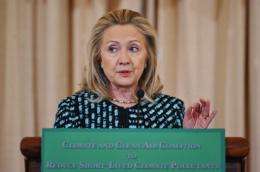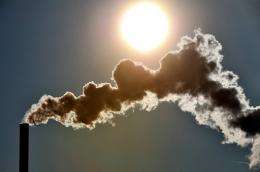US Secretary of State Hillary Clinton speaks at an event to launch "The Climate and Clean Air Coalition to Reduce Short-Lived Climate Pollutants" initiative in the Benjamin Franklin Room of the State Department in Washington, DC. Faulting the world for not doing enough to fight climate change, the United States on Thursday announced the formation of a coalition to cut short-lived pollutants.
Faulting the world for not doing enough to fight climate change, the United States on Thursday announced the formation of a coalition to cut short-lived pollutants that speed up warming and harm health.
US Secretary of State Hillary Clinton said the coalition of the United States, Bangladesh, Canada, Mexico, Sweden and Ghana will launch a global drive to curb black carbon (soot), methane and hydrofluorocarbons (HFCs).
The chief US diplomat said such pollutants survive only a short time in the atmosphere -- unlike long-lasting carbon dioxide, the main climate change culprit -- but account for more than a third of global warming.
"We know that in the principal effort necessary to reduce the effects of carbon dioxide, the world has not yet done enough," Clinton told an audience at the State Department that included envoys from the coalition countries.
"So when we discover effective and affordable ways to reduce global warming -- not just a little, but by a lot -- it is a call to action for all of us," Clinton said.
"This coalition, the first international effort of its kind, will conduct a targeted, practical and highly energetic global campaign to spread solutions to the short-lived pollutants worldwide," she added.
"It will mobilize resources, assemble political support, help countries develop and implement a national action plan, raise public awareness, and reach out to other countries, companies, NGOs and foundations."
A cloud of smoke goes out from a chimney in a winter sky on February 2 in Seclin, northern France. Faulting the world for not doing enough to fight climate change, the United States on Thursday announced the formation of a coalition to cut short-lived pollutants that speed up warming and harm health.
NGOs are non-government organizations that include environmental and other activist groups.
She said the UN Environment Program, which will serve as the coalition's secretariat, has outlined 16 actions that can be taken to cut short-lived pollutants and slow global warming by 0.5 degrees Celsius by 2050.
The world's goal is to limit the rise in temperatures to two degrees by that date, she and US officials said.
Clinton said the work of the coalition will "complement but not supplant" the main international efforts to fight climate change, which focus on cutting carbon dioxide emissions but also other greenhouse gases.
Methane comes from landfills, coal mines, the oil and natural gas industry, agriculture and cows. Black carbon hails from cook stoves, kilns and diesel vehicles, while HFCs are used in aerosols, refrigerators and insulating foam.
Experts say such gases contribute disproportionately to climate change.
"They also destroy millions of tons of crops every year and wreak havoc on people's health," Clinton said.
A senior administration official, citing ways to cut the gases, said "a lot of work done on actions that could reduce the leakage from gas pipelines, that could recover gas that is typically vented in connection with gas production."
Clinton announced an initial $15 million to launch the coalition -- $12 million from the United States and $3 million from Canada.
"We will be reaching out to other countries quite rapidly," the senior administration official told reporters on condition of anonymity.
"There are a number of countries that we have already heard from that have expressed interest in it. And I fully anticipate that this small initial group of six will expand quickly," the official told reporters.
(c) 2012 AFP






















